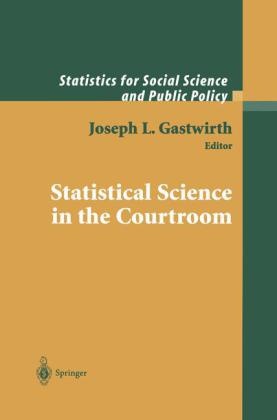Read more
Expert testimony relying on scientific and other specialized evidence has come under increased scrutiny by the legal system. A trilogy of recent U.S. Supreme Court cases has assigned judges the task of assessing the relevance and reliability of proposed expert testimony. In conjunction with the Federal judiciary, the American Association for the Advancement of Science has initiated a project to provide judges indicating a need with their own expert. This concern with the proper interpretation of scientific evidence, especially that of a probabilistic nature, has also occurred in England, Australia and in several European countries. Statistical Science in the Courtroom is a collection of articles written by statisticians and legal scholars who have been concerned with problems arising in the use of statistical evidence. A number of articles describe DNA evidence and the difficulties of properly calculating the probability that a random individ ual's profile would "match" that of the evidence as well as the proper way to intrepret the result. In addition to the technical issues, several authors tell about their experiences in court. A few have become disenchanted with their involvement and describe the events that led them to devote less time to this application. Other articles describe the role of statistical evidence in cases concerning discrimination against minorities, product liability, environmental regulation, the appropriateness and fairness of sentences and how being involved in legal statistics has raised interesting statistical problems requiring further research.
List of contents
From the contents:
Evidence Interpretation and Sample Size Determination, C.G.G. Aitken
- Statistical Issues in the Application of the Federal Sentencing Guidelines in Drug, Pornography, and Fraud Cases, Alan J. Izenman
- Interpreting DNA Evidence: Can Probability Theory Help? David J. Balding
- Statistics, Litigation, and Conduct Unbecoming, Seymour Geisser
- The Consequences of Defending DNA Statistics, Bruce S. Weir
- DNA Statistics Under Trial in the Australia Adversarial System, Janet Chaseling
- A Likelihood Approach to DNA Evidence, Beverly Mellen
- The Choice of Hypotheses When Evaluating DNA Profile Evidence, Anders Stockmarr
- On the Evolution of Analytical Proof, Statistics and the Use of Experts in EEO Litigation, Marc Rosenblum
- A Connecticut Jury Array Challenge, David Pollard
- Issues Arising in the Use of Statistical Evidence in Discrimination Cases, Joseph L. Gastwirth
- Statistical Consulting in the Legal Environment, Charles R. Mann
- Epidemiological Causatio n in the Legal Context: Substance and Procedures, Sana Loue
- Judicial Review of Statistical Analyses in Environmental Rulemakings, Wendy E. Wagner
- Assessing Costs of Smoking for Minnesota - vs. - Tobacco; The Perspective of Statistical Experts in a Landmark Civil Case, Scott L. Zeger, Timothy Wyant, Leonard Miller, and Jonathan Samet
- Statistical Issues in the Estimation of the Causal Effects of Smoking Due to the Conduct of the Tobacco Industry, Donald B. Rubin
- Forensic Statistics and Multiparty Bayesianism, Joseph B. Kadane
- Warranty Contracts and Equilibrium Probabilities, Nozer D. Singpurwalla
- Death and Deterrence: Notes on a Still Inchoate Judicial Inquiry, Robert J. Cottrol
- Introduction to Two Views on the Shonubi Case, Alan J. Izenman
- Assessing the Statistical Evidence in the Shonubi Case, Alan Izenman
- The Shonubi Case as Example of the Legal System's Failure to Appreciate Statistical Evidence, Joseph L. Gastwirth, Boris Freidlin, and Weiwen
- Assessin g the Statistical Evidence in the Shonubi Case, Alan J. Izenman.
Summary
Other articles describe the role of statistical evidence in cases concerning discrimination against minorities, product liability, environmental regulation, the appropriateness and fairness of sentences and how being involved in legal statistics has raised interesting statistical problems requiring further research.

